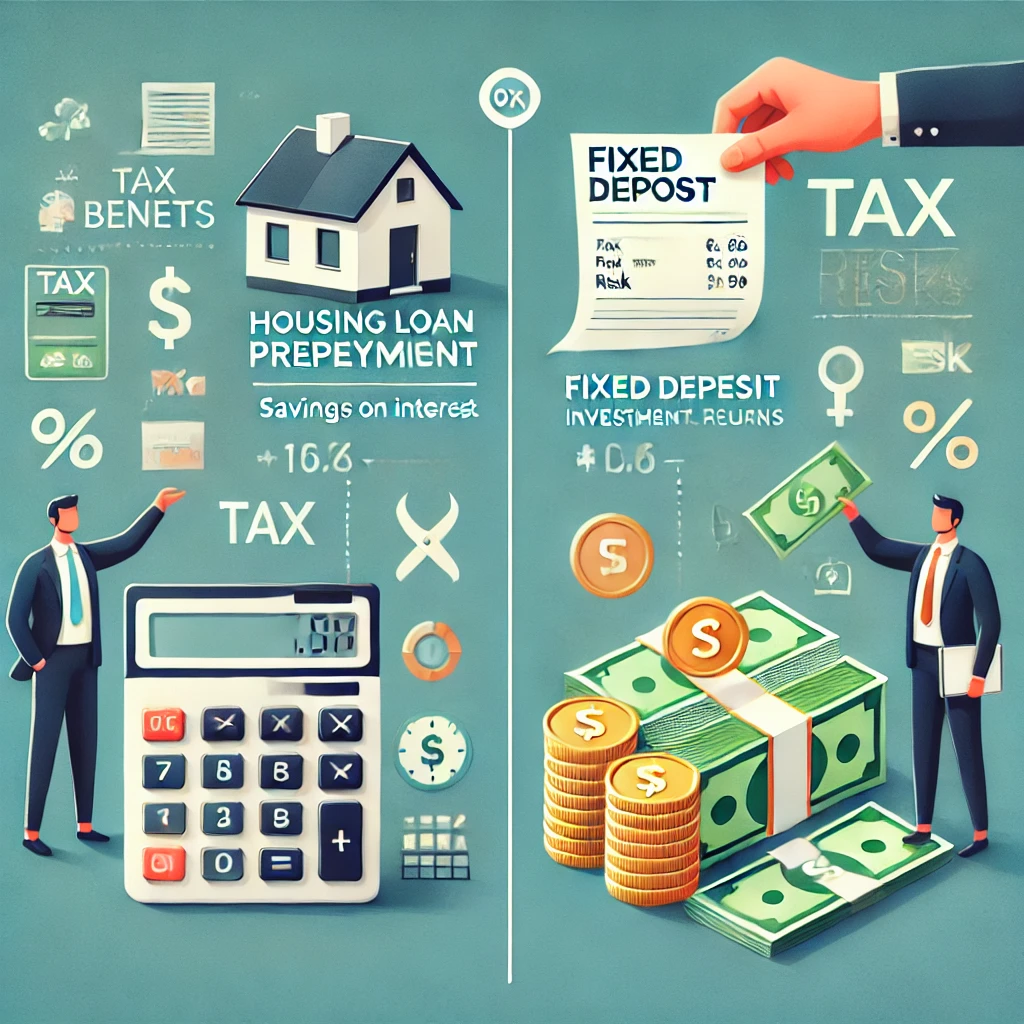Housing Loan Prepayment vs. Fixed Deposits What’s the Better Option?
A detailed comparison of the financial benefits of prepaying your housing loan versus investing in fixed deposits.
Post last updated: November 15, 2024

When you have surplus funds, deciding between prepaying your housing loan or investing in a fixed deposit (FD) can be tricky. Here’s a breakdown of key factors to help you make an informed decision.
💸 Tax Implications 📊
🏡 Tax Deductions on Housing Loans:
- You can claim tax benefits for principal repayment under **Section 80C** and for interest payments under **Section 24(b)**. However, these benefits have limits—for example, the maximum deduction for interest is capped at ₹2 lakh annually. Any interest payments beyond this limit add to your costs.📈 FD Taxation:
- Interest earned from fixed deposits is fully taxable based on your income slab, which significantly reduces your effective returns, especially for individuals in higher tax brackets. Additionally, when inflation is adjusted, the real returns would be even less.⚖️ Reducing Risk and Stress 💆♂️
💰 Prepaying the Loan:
- Clearing your loan reduces financial liabilities and eliminates monthly EMIs, which can ease your financial burden and give you more flexibility.🏦 Investing in FDs:
- While FDs are safe and provide liquidity, they don’t eliminate the strain of ongoing EMIs, which can continue to affect your monthly cash flow. Prepaying your loan not only frees up your cash flow but also reduces the stress of carrying long-term debt.💡 Saving More Over Time 🕰️
🏠 Housing Loan Interest Costs:
- Housing loans accrue compound interest, significantly increasing the total amount repaid. Paying off your loan early can save you from these additional costs.Example: A ₹10 lakh loan at an 8% interest rate over 20 years will result in total interest payments of around ₹9.5 lakhs.
📊 FD Returns:
- Fixed deposits offer simple interest, and after-tax returns are much lower. With inflation adjustments, they would be even less.Example: A ₹10 lakh FD at 6.5% (post-tax return of 4.5%) over 20 years will earn only about ₹5.4 lakhs.
The savings from avoiding housing loan interest are significantly higher than the returns you would earn from an FD.
Worried About Not Having Money Post-Paying Housing Loan❓ 💸
Some people worry that prepaying a housing loan will leave them with limited liquidity. A top-up loan can solve this issue.
🔑 What Is a Top-Up Loan?
- A top-up loan allows you to borrow additional funds on your existing home loan, usually at lower interest rates than personal loans or credit card debt.💡 Advantages:
- **💵 Lower Interest Rates:** While slightly higher than a regular home loan, top-up loans are much cheaper than personal loans. - **🛠️ Flexible Usage:** The funds can be used for emergencies, education, home improvement, or any other purpose. - **📑 Tax Benefits:** If used for home construction or renovation, the interest on the loan may qualify for deductions under **Section 24(b)**.Example: If you prepay a ₹10 lakh loan and later need ₹5 lakhs, you can take a top-up loan at ~9%, which is far cheaper than personal loans at 12%-15%.
Prepaying your loan doesn’t mean giving up financial flexibility. Top-up loans allow you to access funds when needed while enjoying the benefits of reduced liabilities.
🧘♂️ Psychological and Credit Advantages 💳
By enhancing financial stability and removing stress associated with debt, loan repayment promotes peace of mind. Additionally, it improves your creditworthiness and reflects prudent financial activity, which raises your credit score.
💡 When FDs Might Be a Better Choice? 📈
While prepaying your housing loan is usually the better option, there are exceptions:
- If your loan has a low interest rate, such as a subsidized or promotional rate.
- If you have opportunities to invest in higher-return options like mutual funds or equities and can comfortably manage your EMIs.
- If you need to maintain liquidity for short-term goals or unexpected expenses.
📝 Author’s Final Thoughts
The majority of consumers find that paying down a home loan has greater financial advantages than investing in FDs. You can increase cash flow, lower interest expenses, and gain more financial serenity by lowering your loan obligations. Furthermore, top-up loans guarantee that you will always have access to money when you need it, making loan prepayment a flexible and wise financial choice.
Have questions or need support? Feel free to reach out to us!
Email: admin@fincalci.com
Author:





